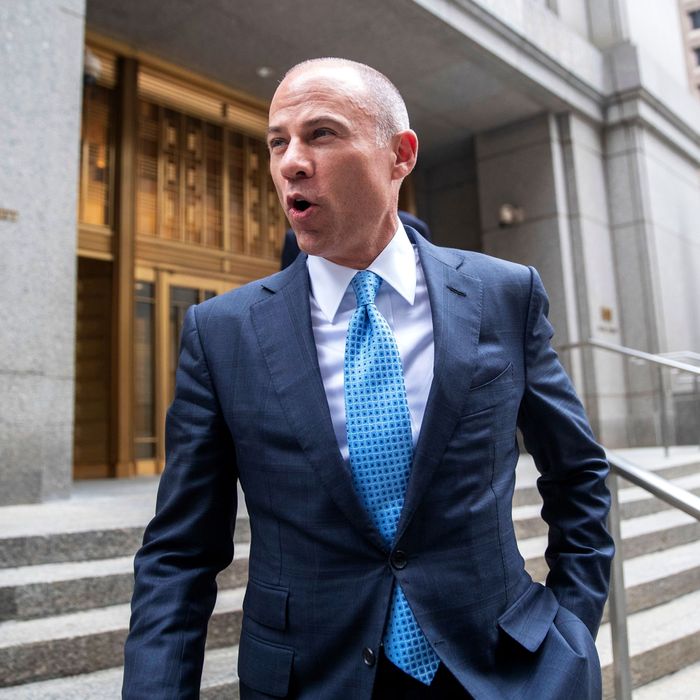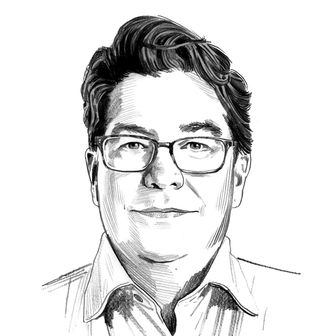
Over the last year or so, the swift and not particularly surprising fall of lawyer Michael Avenatti has descended through the circles of bankruptcy, alleged domestic violence, banishment from cable television, and separate indictments for tax fraud, extortion, and cheating Stormy Daniels, his most important client. In mid-January, federal agents arrested Avenatti in the middle of a disciplinary hearing before the State Bar of California and charged him with violating his bail agreement. (They alleged he was trying to hide money from creditors.) For the past two weeks, Avenatti has been held in solitary confinement in the high-security wing of the Metropolitan Correctional Center in Manhattan, the notoriously squalid jail where Jeffrey Epstein died. His lawyers claim he sleeps shivering under three blankets in a cell previously occupied by Joaquín “El Chapo” Guzman.
On Thursday, though, Avenatti’s very bad year reached what, to him, must have felt like a nadir. Sitting at the defense table in a stately courtroom in the old federal courthouse on Centre Street, he kept shooting searching glances into the mostly empty gallery. No CNN reporter in sight. The network was instead broadcasting gavel-to-gavel coverage of Donald Trump’s impeachment — a political crisis that Avenatti predicted and, in some ways, helped to create. The paparazzi were staking out a nearby state courthouse, where a procession of actresses and models were testifying against Harvey Weinstein. Avenatti was not even the most famous defendant in a two-block area. His story arc was wrapping up, and no one was tuning in.
That was ironic, because Avenatti’s trial, the first of three he faces in coming months, was all about his power to command attention. Avenatti is accused of threatening to expose a scandal he had discovered involving Nike and alleged payoffs to elite high-school basketball players — unless the sneaker company paid him tens of millions of dollars. Avenatti claims that it was just a tough settlement negotiation, and his defense is making the case that he was the caught in a trap set by Nike and its law firm, Boies Schiller Flexner. But the lead prosecutor, in his opening argument, called the negotiation a “shakedown” in which Avenatti offered a corrupt bargain: “Money for silence.”
The underlying facts involving corruption in amateur athletics are convoluted and hardly shocking to anyone who pays attention to sports. What is remarkable about Avenatti’s trial is the portal it has opened into the black-box marketplace for damaging secrets — a common element that runs through all of Trump’s scandals as well as the prosecutions of Weinstein and Epstein and countless other recent legal cases. Under the system, known at the high end as “crisis management” and the low end as “catch and kill,” corporations and wealthy individuals engage attorneys to protect themselves from victims, whistle-blowers, aggrieved partners, gossips, hackers, and other possessors of sensitive information. Avenatti — a combative, chisel-jawed Los Angeles litigator — made his name crusading against the system. His representation of Daniels, the porn star who claimed to have had an affair with Trump, revealed a hush-money operation involving the National Enquirer and ended up sending Trump fixer Michael Cohen to prison. Avenatti was always a flawed messenger, disdained by some natural allies and despised by his many enemies — a mirror image of his sworn adversary, Trump. But his successes were real and encouraged some to hope, however naïvely, that the anti-Trump resistance might be able to write new rules of accountability. His disgrace appears to have revealed, with sad predictability, that it was a cynical game to him all along.
The Daniels case made Avenatti, for a while, into an inescapable presence on cable-news shows and social media, and he even talked about running for president. Then, prosecutors claim, he put that celebrity to criminal purposes.
“The defendant had a weapon, a very modern weapon,” Assistant U.S. Attorney Robert Sobelman said in his opening statement on Wednesday, citing Avenatti’s Twitter following (current count: 763,900). “And he found a way to use that weapon.”
According to the prosecution, Avenatti’s extortion scheme unfolded over the course of roughly a week last March. At the time, he was under severe financial stress. His firm had filed for bankruptcy to avoid paying a
$10 million judgment it owed to a former employee, a lawyer who alleged Avenatti had redirected money belonging to the firm and its clients toward personal expenses like rent and payments on his Ferrari. (Avenatti has since been charged in separate proceedings with stealing $300,000 in book-advance proceeds from Daniels and embezzling $12 million from other clients.) His media profile was also starting to wane. Although Avenatti had tallied a stunning 254 television appearances over the prior year, according an analysis by the conservative website Newsbusters, bookings had slowed dramatically after he floated a lurid and quickly discredited claim in the heat of the Brett Kavanaugh confirmation hearings. Amid the turmoil, Avenatti was contacted by a basketball coach who was angry with Nike.
The coach, Gary Franklin, ran an elite club team called California Supreme, which featured some of the best high-school talent in the country. Sneaker companies like Nike sponsor such teams with the aim of developing relationships with young players who may one day become stars in college and the NBA. Franklin’s team had featured players like Deandre Ayton, later to become the first pick in the 2018 NBA draft, and Bol Bol, the seven-foot-two son of Manute Bol who now plays for the Denver Nuggets. But Nike had declined to renew its $72,000 annual sponsorship contract with California Supreme. Franklin was considering suing Nike over the contract but was having trouble finding a lawyer who was willing to go up against the powerful corporation. An associate of Franklin’s, a veteran sports consultant, suggested Avenatti might be the right guy. Defense attorney Howard Srebnick, in his opening argument, said the consultant sent Franklin 119 videos of Avenatti’s TV appearances.
“They wanted this man right here,” Srebnick said, jabbing his finger at Avenatti, “because he had the platform to expose what happened at Nike.”
What had happened, according to Franklin, stood to put Nike in legal jeopardy. The story he told Avenatti has not been challenged by either the prosecution or the defense. Franklin told Avenatti that he had funneled payments from Nike to several players the company was trying to cultivate using phony invoices to cover his tracks. Once, Franklin recounted, Nike executives had told him to fly to Arizona to give Ayton’s mother $10,000 in cash. “I mean cash-cash,” Srebnick said in court. “Green dollar bills.” Franklin claimed that he hadn’t wanted to play the middleman, but he had been “bullied” into it by his sponsors. He also knew that a criminal investigation into a similar scheme at Adidas had recently resulted in three prison sentences.
Avenatti agreed to represent Franklin. Srebnick claimed that the coach paid him nothing up front; the lawyer would work on contingency. For assistance, Avenatti brought in a second celebrity attorney, Mark Geragos, who had recently represented quarterback Colin Kaepernick in his collusion lawsuit against the NFL. Kaepernick was also sponsored by Nike. Geragos contacted a senior attorney at the shoe company, offering vague warnings of a potential scandal. Nike referred him to an outside law firm, Boies Schiller.
With that, the story took a turn into the shadowlands. Boies Schiller has a reputation for excellence in the courtroom and an equally persistent habit of showing up in the middle of weird tangles involving secrets and reputations — a history that Avenatti’s lawyers appear to be trying to use to their advantage. On Thursday, down the street at the Weinstein trial, a Boies Schiller partner was testifying about the firm’s decision to hire a private intelligence firm called Black Cube to monitor women and journalists on behalf of the producer, a longtime client. The firm’s legendary founder, David Boies, also represents some Epstein victims and recently showed up in the middle of a New York Times investigation into an odd plan to procure dubious sex tapes that were purported to feature rich friends of the pedophile financier. Srebnick has sought to put the work that the firm did for Nike at the center of his defense, claiming it was trying to “whitewash” allegations about improper, and maybe illegal, corporate behavior.
On March 19, 2019, at Geragos’s office on Fifth Avenue, he and Avenatti met with a delegation of lawyers for Nike, including a Boies Schiller partner named Scott Wilson. (He has since gone to another firm.) Wilson asked Avenatti what the meeting was about. “He responded, in essence, that if you thought it was bad for Adidas, it will be a lot worse for Nike,” according to Wilson, and refused to say much more unless Nike agreed to proceed under a legal rule making settlement discussions confidential. Unbeknownst to Avenatti at the time, Wilson had been dealing for months with federal prosecutors in Manhattan, who had subpoenaed Nike for information that included its business arrangements with Franklin. So far, though, that hadn’t leaked.
Wilson agreed to proceed in secrecy and then Avenatti described his client’s allegations about payments to future NBA players and produced some supporting documents. Wilson testified that Avenatti told him he had a Times reporter “on speed dial” and was ready to hold a press conference the next day. He said Avenatti pointed out that the timing would be particularly devastating, because the NCAA basketball tournament — one of the biggest events on the sports calendar — was set to begin in two days, and Nike was also due to report its quarterly stock earnings.
“He thought he had leverage,” Wilson testified. “He thought he had explosive information and a platform through Twitter … to gin this up and turn it into a massive media scandal.” Avenatti said the problem would go away, Wilson testified, only if Nike agreed to an immediate settlement. Wilson asked Avenatti if he was wearing a wire, and he said the lawyer laughed and opened his suit coat. Trying to buy time, Wilson asked for a few days to confer with his client and urged Avenatti to be cautious, saying the revelations would hurt some young players.
“He leaned forward and shouted at me, ‘I don’t give a fuck about these kids,’” Wilson testified. “Or, ‘I don’t give a shit about these kids.’”
Whichever expletive he used, Wilson testified, the message was delivered. Wilson said he would talk to Nike’s general counsel and come back with an answer the next day. Instead, he called the U.S. Attorney’s office, and the FBI began monitoring the negotiations. Over the next few days, Wilson stalled, trying to draw Avenatti into an explicit extortion demand. They had discussed a two-part deal: a $1.5 million settlement for Franklin and an agreement that Nike would hire Avenatti and Geragos to conduct an internal investigation. Such probes are common when companies are found to have engaged in misconduct. In theory, they allow companies to correct problems; in practice, they often serve to keep them quiet.
“We think we can make something happen,” Wilson said in a taped conference call with Geragos and Avenatti on March 20. He said he thought the $1.5 million settlement for the coach would be acceptable to Nike but expressed hesitation about the investigation. Avenatti exploded. “If you don’t wanna do that, we’re done here,” he said. “I’m not fucking around with this, and I’m not continuing to play games.”
As his diatribe echoed across the cavernous courtroom, Avenatti stroked his chin, narrowed his eyes, and put on his reading glasses. “It’s worth more in exposure to me to just blow the lid on this thing. A few million dollars doesn’t move the needle for me,” he shouted on the taped call. “I’ll just call the New York Times, who are awaiting my call. I’ll take $5 billion off your market cap. I am not fucking around.” The two lawyers haggled over the cost of Avenatti’s proposed investigation, with Wilson eventually suggesting that “something in the $10-to-$20 million range” might be reasonable.
The following afternoon, Wilson met with Geragos and Avenatti again to work out the details of the internal investigation, bringing along a hidden camera. In the video shown in the courtroom, shot vertically upward from the conference-room table, Avenatti appeared tense at the outset, sitting quietly as Wilson and Geragos made small talk, his jaw clenched as he gripped his chair’s armrests, his cuff links flashing. Abruptly, he tossed a draft settlement across the table, addressing the coach’s claims against Nike, which by now were an afterthought.
“So here’s the ask,” Avenatti said, leaning back in his chair and scratching his palm. He proposed an investigation costing a minimum of $15 million and a maximum of $25 million. Wilson told Avenatti he had never conducted an investigation that cost more than $10 million. “Have you ever held the balls of a client in your hand, where you could take $5 to $6 billion of market cap off of them?” Avenatti asked. “I’m going to bring the power of my platform to bear. Nike has their platform, and I have my platform.”
Geragos attempted to conciliate, saying that “besides cashing checks, we like to also effect change.” (Prosecutors did not charge him with a crime.) But Avenatti stubbornly kept repeating his terms: a confidential investigation or public exposure. Eventually, he came up with a figure that could convince him to walk away. “If Nike wants to have one confidential settlement and we’re done, they can buy that for $22.5 million,” Avenatti said. “Full confidentiality, and we ride off into the sunset.” He said he was finished negotiating, though, laying out the alternative scenario. “As soon as this becomes public, I am going to receive calls from all over the country from parents and coaches and all kinds of people. This is always what happens. And they are all going to say I’ve got an email or a text message or … Now, 90 percent of that is going to be bullshit, because 90 percent of the time, always, whether it’s R. Kelly or Trump, the list goes on and on — but 10 percent of it is actually going to be true.
“And then what’s going to happen is that this is going to snowball,” Avenatti went on. “And every time we got more information, that’s going to be the Washington Post, the New York Times, ESPN, a press conference. And the company will die — not die, but they are going to incur cut after cut after cut after cut.” It doesn’t seem to have occurred to Avenatti that there might be another outcome: that he would be the one caught and killed.
Srebnick, Avenatti’s lawyer, argued that while his client might have been “brash, tenacious, bullish, hard-charging,” he was always acting as an honest lawyer, representing a client who wanted a company’s unethical behavior — which Wilson did not dispute — to be punished and corrected. “They were hiring Michael Avenatti to be Michael Avenatti,” Srebnick said. “Everyone knew who Michael Avenatti was. Boies Schiller knew who Michael Avenatti was. That’s why they were on red alert.”
Wilson readily admitted that Nike and Boies Schiller were afraid of Avenatti’s media influence. They just neutralized the threat in their own way — with a sting. A prosecutor asked Wilson if he ever really thought they were engaged in settlement talks. “No, not at all,” Wilson replied. “I thought what I was engaging in was a stickup.”
Now Avenatti is in a solitary cell, and the show has moved on. When the trial broke for lunch, I walked out and saw a group of photographers clustered by the courtroom steps.
“You here for Avenatti?” I asked one of them.
“No,” he said, shaking his head. “Lev Parnas.”






























